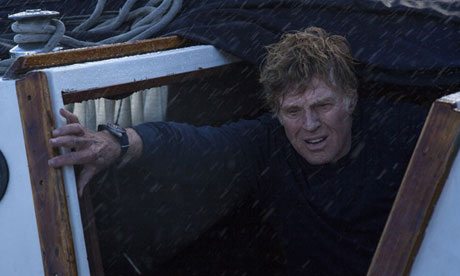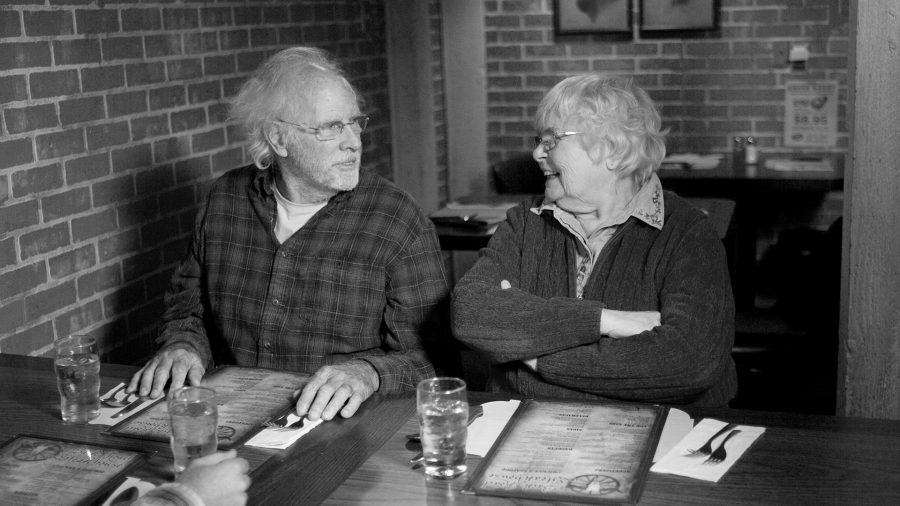
 "All is Lost" could easily be retitled "Old Man Fixes His Boat", because that's really all it is. Robert Redford stars as Our Man, making a solo voyage in his small yacht in the middle of the Indian Ocean. After a brief opening narration, which we don't realize will be the only extended dialogue in the entire film, Our Man wakes up to find water flooding his vessel. He rushes to the deck and finds an enormous container (presumably jettisoned off a cargo ship) smashed into his hull, breaching it and letting water flow in undeterred, destroying his radio and navigation equipment. The rest of the movie observes Our Man as he attempts to patch up his boat and safely enter the Sumatra Straits, where he can potentially find rescue.
"All is Lost" could easily be retitled "Old Man Fixes His Boat", because that's really all it is. Robert Redford stars as Our Man, making a solo voyage in his small yacht in the middle of the Indian Ocean. After a brief opening narration, which we don't realize will be the only extended dialogue in the entire film, Our Man wakes up to find water flooding his vessel. He rushes to the deck and finds an enormous container (presumably jettisoned off a cargo ship) smashed into his hull, breaching it and letting water flow in undeterred, destroying his radio and navigation equipment. The rest of the movie observes Our Man as he attempts to patch up his boat and safely enter the Sumatra Straits, where he can potentially find rescue.
There is no arguing that "All is Lost" is thematically strong. With roughly 10 lines of dialogue over the course of 107 minutes, writer-director JC Chandor heavily relies on imagery and actions to tell his story. But in order to fully appreciate the subtleties and themes of any movie, one must first develop a strong interest in the material. The huge problem with "All is Lost" is that we are never given a reason to care about Our Man. Who is he? Why is he making this voyage? What did he do for a living? What's his family life like? What are his beliefs? Chandor gives us absolutely zero information about Our Man, making it impossible to empathize with him. He claims that he wanted Our Man to be a conduit, a blank slate for us to inject ourselves into the scenario, but that feels cheap and lazy. Other than the fact that he is a human being and I'd generally prefer if other people didn't die, there isn't any reason to emotionally invest yourself in the character. Live or die, it won't feel like a loss, because there's nothing to lose. We don't even know his name.
The saving grace of "All is Lost" lies in the aforementioned visuals and the elegance of Redford's performance. Our Man faces two huge obstacles in the form of violent tempests, and the 77-year-old Redford was game to overcome these challenges without use of a double. Chandor says that there is maybe one shot in the whole film that isn't actually Redford, but all the tough swimming and fighting for survival was the man himself. Redford doesn't do what you'd expect here and make Our Man panic in the face of danger. No matter what obstacle arises, he approaches it with a measured calm and coolness. There is one moment when he loses his unbreakable visage, but it doesn't last. He doesn't see a point in wallowing in worry. It's about putting yourself in the best position to get rescued, and panicking won't help.
When it's all over, you may remember "All is Lost" with some fondness for its themes, but actually watching it is a bit of a chore. Survival movies simply don't work if we don't care if they survive.
 "Nebraska", the new film by Alexander Payne, is a very different type of road trip comedy. The travelers aren't horny teens on spring break or middle-aged men touring wine country (like Payne's "Sideways"), but a father and son driving towards a fake fortune. The unkempt, perpetually confused Woody Grant (Bruce Dern) has been taken in by one of the oldest scams in the book. In fact it's so old, his son David (Will Forte) can't believe it's even still around. Woody received a sweepstakes certificate claiming that he could be the one million dollar winner, and he plans on claiming his prize in person - by making the 750 mile journey from Billings, Montana to Lincoln, Nebraska. The shambling old man keeps "running" away from home, forcing his fed up wife Kate (June Squibb) to call David and his local anchorman brother Ross to figure out something to do with their booze-addled father. David decides that since Woody won't stop running away, he might as well drive him to Nebraska safely. Along the way, hopefully they'll bond the way they never did when he was younger.
"Nebraska", the new film by Alexander Payne, is a very different type of road trip comedy. The travelers aren't horny teens on spring break or middle-aged men touring wine country (like Payne's "Sideways"), but a father and son driving towards a fake fortune. The unkempt, perpetually confused Woody Grant (Bruce Dern) has been taken in by one of the oldest scams in the book. In fact it's so old, his son David (Will Forte) can't believe it's even still around. Woody received a sweepstakes certificate claiming that he could be the one million dollar winner, and he plans on claiming his prize in person - by making the 750 mile journey from Billings, Montana to Lincoln, Nebraska. The shambling old man keeps "running" away from home, forcing his fed up wife Kate (June Squibb) to call David and his local anchorman brother Ross to figure out something to do with their booze-addled father. David decides that since Woody won't stop running away, he might as well drive him to Nebraska safely. Along the way, hopefully they'll bond the way they never did when he was younger.
Filmed in black and white Cinemascope, "Nebraska" captures the muted tones of a dying midwest. All the towns seem to be on their last legs, their rich history covered with dust. The same applies to Woody, who we first know as an old man falling apart. As Bob Nelson's beautiful screenplay unfolds, we see Woody as so much more than that. His stubbornness and confusion starts to look more like hopeful naivete. Time has taken its toll on the veteran, and excessive alcohol consumption didn't help. But beneath it all he is a complex man, and possibly even a good one. He's no saint, but as we get to know his family and old friends in Hawthorne, Nebraska, we see he's not the worst member of the Grant bloodline.
Bruce Dern likely has an Oscar nomination in his future, and it's well deserved. Woody is a frank man with a bit of a vacant mind, and has spent his whole life getting taken in by swindlers. Woody doesn't change throughout the film, but our perception of him does, allowing us to view Dern's performance as dynamic instead of one-note. Dern manages to make us sympathize with the old man, even when he's just being cranky. His deadpan delivery provides some much needed humor to some serious situations. Despite being opposite SNL alum Will Forte, it's Dern that gets most of the laughs here. This might be Forte's first ever serious role, and he handles it admirably. He is bewildered when it comes to bonding with his father, and Forte finds all that disappointment that comes with it. He also shines in moments of discovery, when he tears down the wall and actually gets to know about Woody's past. Stealing many scenes is June Squibb as Woody's loud and slightly inappropriate wife Kate. Squibb's glib monologues are rich sources of humor, sadness, and in one applause-worthy instance, catharsis.
"Nebraska", just like Payne's previous "The Descendants", is technically fine in all respects, but lacks a big punch to really leave it stuck in your mind afterward. With Dern's and Squibb's touching performances and Bob Nelson's thoughtful screenplay, "Nebraska" offers plenty to appreciate. But one can't help but feel like it could have been even better.